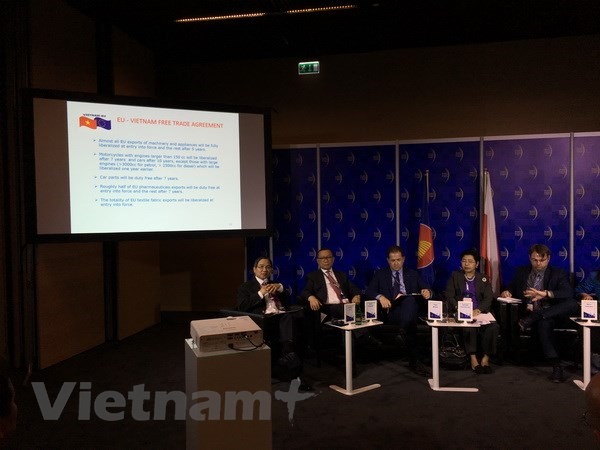The upcoming European Union-Viet Nam Free Trade Agreement (EVFTA) will create a strong driving force for fostering a comprehensive economic partnership between Viet Nam and the European Union via the abolition of 99 per cent of import tariffs in the next seven to 10 years.

The upcoming European Union-Viet Nam Free Trade Agreement (EVFTA) will create a strong driving force for fostering a comprehensive economic partnership between Viet Nam and the European Union via the abolition of 99 per cent of import tariffs in the next seven to 10 years.
Janusz Piechocinski, chairman of the Polish-Asian Chamber of Commerce and former Polish Deputy Prime Minister, said this at a thematic session on ASEAN-European Union economic cooperation held recently in Warsaw, Poland. The session was held for the first time within the framework of the 10th European Economic Congress (EEC).
According to other delegates, the Polish government strongly supports the deal and ranks Viet Nam among the five priority markets, adding that Polish firms will be at an advantage doing business in Viet Nam.
Vietnamese ambassador to Poland Vu Dang Dung presented six competitive edges of the Vietnamese economy, including its entry to free trade deals with developed economies in North America, Europe and Asia.
Nguyen Duc Thanh, director of the Viet Nam Institute for Economic and Policy Research and former member of the Prime Minister’s economic consulting group, noted that Viet Nam had maintained its strong growth since 2017 and that its consistent institutional and social reform would open new opportunities for economic growth.
Tran Ngoc Liem, deputy director of the HCM City chapter of the Viet Nam Chamber of Commerce and Industry, suggested foreign investors to pour capital into farm produce, pharmaceuticals, construction machinery, mining, green technology, water and wastewater treatment, renewable energy, real estate, electronics, non-alcoholic beverages, wooden furniture and luxury fashion in Viet Nam.
Patrycja Pendrakowska, president of the Poland-Asia Research Centre, highlighted Viet Nam’s efforts to deal with the European Union’s “yellow card” warning on illegal, unreported and unregulated fishing, including the adoption of the Law on Fisheries 2017 with terms in accordance with the EU standards, specific action plans and regular consultation with the European Union.
She also lauded Viet Nam for organising widespread communications campaigns to encourage fishermen to tap aquatic products in line with the EU regulations.
As the largest annual forum in Central and Eastern Europe, EEC was attended by Polish Prime Minister Mateusz Morawiecki, European Commissioner for Trade Cecilia Malmstrom as well as 11,000 delegates from many other countries. — VNS





